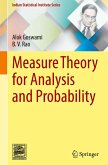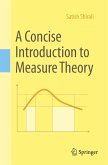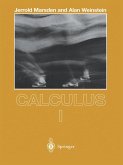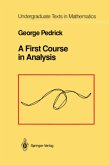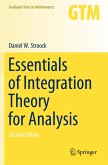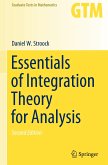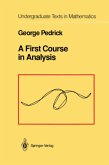This book can serve as a first course on measure theory and measure theoretic probability for upper undergraduate and graduate students of mathematics, statistics and probability. Starting from the basics, the measure theory part covers Caratheodory s theorem, Lebesgue Stieltjes measures, integration theory, Fatou s lemma, dominated convergence theorem, basics of Lp spaces, transition and product measures, Fubini s theorem, construction of the Lebesgue measure in Rd, convergence of finite measures, Jordan Hahn decomposition of signed measures, Radon Nikodym theorem and the fundamental theorem of calculus.
The material on probability covers standard topics such as Borel Cantelli lemmas, behaviour of sums of independent random variables, 0-1 laws, weak convergence of probability distributions, in particular via moments and cumulants, and the central limit theorem (via characteristic function, and also via cumulants), and ends with conditional expectation as a natural application of the Radon Nikodym theorem. A unique feature is the discussion of the relation between moments and cumulants, leading to Isserlis formula for moments of products of Gaussian variables and a proof of the central limit theorem avoiding the use of characteristic functions.
For clarity, the material is divided into 23 (mostly) short chapters. At the appearance of any new concept, adequate exercises are provided to strengthen it. Additional exercises are provided at the end of almost every chapter. A few results have been stated due to their importance, but their proofs do not belong to a first course. A reasonable familiarity with real analysis is needed, especially for the measure theory part. Having a background in basic probability would be helpful, but we do not assume a prior exposure to probability.
The material on probability covers standard topics such as Borel Cantelli lemmas, behaviour of sums of independent random variables, 0-1 laws, weak convergence of probability distributions, in particular via moments and cumulants, and the central limit theorem (via characteristic function, and also via cumulants), and ends with conditional expectation as a natural application of the Radon Nikodym theorem. A unique feature is the discussion of the relation between moments and cumulants, leading to Isserlis formula for moments of products of Gaussian variables and a proof of the central limit theorem avoiding the use of characteristic functions.
For clarity, the material is divided into 23 (mostly) short chapters. At the appearance of any new concept, adequate exercises are provided to strengthen it. Additional exercises are provided at the end of almost every chapter. A few results have been stated due to their importance, but their proofs do not belong to a first course. A reasonable familiarity with real analysis is needed, especially for the measure theory part. Having a background in basic probability would be helpful, but we do not assume a prior exposure to probability.


